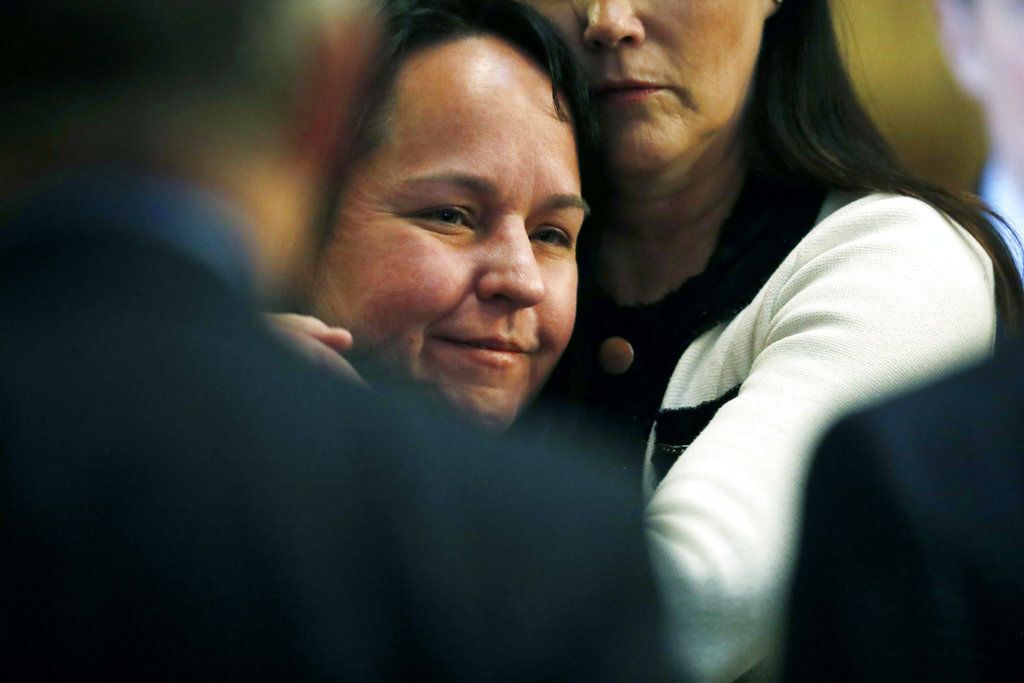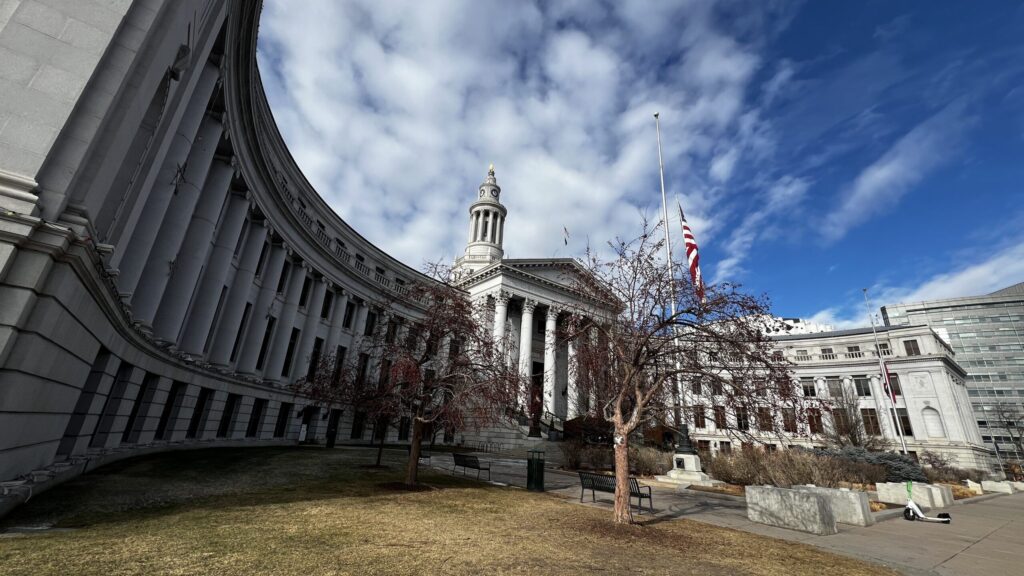Colorado Democrats advance bill requiring ‘density goals’ for urban governments
A majority of House Democrats on Sunday approved legislation that would require local governments in urban corridors to plan and implement housing “density goals” approved by the state, the overarching goal of which — sponsors said — is to promote more housing near transit systems.
But the bill’s fate is far from certain. Indeed, the measure revived largely the same state-versus-local-control arguments that doomed a housing and zoning measure from last year.
The focus is on “transit-oriented communities,” which was also part of the 2023 legislation.
Sponsors claim House Bill 1313 would encourage more housing near public transit and workplaces. The bill would create a grant program and technical assistance to support the campaign, paid for with general fund dollars. But it would also penalize municipalities that don’t comply — by forfeiting their state allocation of funding from the Highway Users Tax Fund.
That provision is causing some heartburn even among Democratic House legislators who voted for the measure. Municipalities also balked at the proposal, arguing zoning issues should be left to local governments, not the state, to tackle.
House Democrats approved HB 1313 on a 37-24 vote. Seven Democrats, all from the areas the bill would cover, voted against the measure, with many citing concerns about stripping local governments of highway transportation funding for noncompliance.
And even those who voted for the bill are troubled by some aspects of it, and hoped the Senate, where it’s headed, would address their concerns. One Democrat who voted for it vowed to work for its defeat if it comes back from the Senate in its current form.
At its core, HB 1313 requires housing constructed adjacent to transit to be affordable — through public subsidies, “inclusionary” zoning ordinances and deed restrictions. That also mans restrictions or limits on maximum rental or sale price. The bill also requires a specified period when only low- or moderate-income households could qualify.
The measure applies to about 31 municipalities with a minimum population of 4,000 each and that are part of a metropolitan planning organization (MPO). There are five MPOs in Colorado: the Denver Regional Council of Governments, the North Front Range MPO, the Pikes Peak Area Council of Governments, the Pueblo Area Council of Governments and the Grand Valley MPO on the Western Slope.
As such, the bill would apply to the state’s largest metro areas, largely along the Front Range, and exclude mountain and rural communities that don’t have transit centers.
The fiscal analysis said local governments would be mandated to plan and implement housing density goals approved by the Colorado Department of Local Affairs. The analysis also said that, in addition to forfeiting their state allocation of funding from the Highway Users Tax Fund, noncompliant communities may face an injunction — the bill grants the local affairs department permission to obtain a court injunction against such municipalities.
Critics, including some House Democrats, view HB 1313 as the 2024 version of Senate Bill 23-213, the zoning mandate on local governments that died on the last day of the 2023 session. That’s bill demise was a major defeat for Gov. Jared Polis.
The House debated the measure on Friday, with more than two dozen amendments offered, many attempting to water it down and to remove the Highway Users Tax Fund fine without success.
The bill carries a cost of $35 million in general funds, a tall order in a year when the money available to spend in what’s called the “set aside” for bills still working through the process to no more than $22 million.
In addition, the fiscal analysis pointed out the bill in its current form is projected to decrease general fund revenue over a 15-year period beginning in FY 2024-25 and continuing through FY 2038-39.
The bill’s pathway through the Senate will depend on whether the opposition to HB 1313 matches the intensity of the opposition to SB 213 last year.
HB 1313 has the same opposition from outside the legislature that the 2023 bill drew, notably the Colorado Municipal League, Colorado Counties, Inc., as well as dozens of cities located in the metropolitan planning organizations.
The opposition is united by the same reasons last year — notably what critics argued is a state effort to take over local control.
A March 28 letter from 90 cities and towns pleaded with lawmakers to work with local communities, instead of against them.
“Last year, Colorado municipal leaders pledged to work as partners with Gov. Polis and proponents of affordable housing legislation toward common goals,” the group said, adding that, instead, the measure presented a “missed opportunity.”
Just like last year, lawmakers and the governor pushed bills focused on mandating local government zoning changes, which the group said flies in the face of the Colorado Constitution. The constitution, they said, allows home rule cities to self-govern on a number of issues, notably zoning.
“We urge you to treat municipal leaders as partners, not adversaries, and pass meaningful legislation that will build on the success of Proposition 123 and the 200 communities that have signed on to meet its goals,” the municipalities said.
As for legislation addressing transit, the municipalities urged lawmakers to “support outcomes that fulfill the promises made of safe and reliable transit, so that municipal leaders can attract developers willing to build the high-density development that people will want” and still honor the state’s home rule traditions
The municipalities said they will use home rule and “local control” to develop what they described as locally-appropriate solutions to address the issue of housing affordability and availability.
The bill’s sponsors, Democratic Reps. Steven Woodrow of Denver and Iman Jodeh of Aurora, did not defend the bill during Sunday’s debate, in which there were as many Democrats expressing worries about the measure as Republicans did.
Rep Jenny Willford, D-Northglenn, who supports the measure but whose city is in an “amend” position, said cities that are geographically small, like hers, depend on regional cooperation.
“When you have one community carrying the water for the rest, those partners aren’t carrying their load,” she said.
She said a community north of hers doesn’t want more affordable housing and that’s not fair.
“We need everyone to be engaged in a solution to address this problem.”
This bill offers reasonable, targeted and flexible options for local governments that will improve affordability and air quality, she said.
Willford said she didn’t love the idea of pulling Highway Users Tax Fund funding from municipalities that refuse to comply with the measures, which would affect her community.
She voted for the measure, she said, because “there’s much work ahead of us” and she wasn’t willing to throw the bill out for the Highway Users Tax Fund issue.
Meanwhile, Rep. Marc Snyder, D-Manitou Springs, who voted for the measure, told reporters he is “offended” by the Highway Users Tax Fund penalty and hopes a better bill would emerge from the Senate.
There are a lot of great things in this bill, added Rep. Julia Marvin, D-Adams County, who also voted for the bill, despite concerns. She said she likes the housing goals, the flexibility for how municipalities meet the goals and its funding sources.
But her city council has raised concerns with the Highway Users Tax Fund penalty, which could result in major losses and make roads unsafe for years to come, she said.
Amendments that could have removed that opposition failed on Friday, she said.
“This bill needs some work,” she said, adding that, as it moves to the Senate, it must address the legitimate concerns of many city councils.
Snyder said he reluctantly voted for the bill in House Finance, hoping the HUTF fine would go away.
“I support transit-oriented development,” he said, noting he has lived in those kinds of communities in the past. “I’ve seen it work,” he said.
Snyder said mayors across the state, including the mayors of Aurora and Colorado Springs, support transit-oriented communities. (Both cities are listed as opposed to the bill). The city of Colorado Springs alone would lose $200 million from its share of the Highway Users Tax Fund issue, assuming it balks at complying with the bill.
Every Colorado pays into HUTF funds “and now we’re telling them we’re withholding it so we can strong-arm you into believing in this,” he said, describing the provision as a “sword of Damocles” over its head.
He also said the fine looks like retribution for SB 213 failing last year, adding that if came back from the Senate in its same form, he would do everything in his power to defeat the bill.











